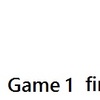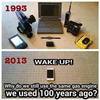Harold Furchtgott-Roth writes occasionally for Forbes. "From 1997 through 2001, Mr. Furchtgott- Roth served as a commissioner of the Federal Communications Commission. Before his appointment to the FCC, he was chief economist for the House Committee on Commerce and a principal staff member on the Telecommunications Act of 1996." He has a history similar to Chip Pickering (who is CEO of Comptel after being a Mississippi Congressman) or Earl Comstock.
Furchtgott-Roth writes, "The FCC set up a casino with federal communications regulation. It was a coin toss: heads one industry favored by the FCC would win; tails another industry hostile to the FCC would win. The courts were left to toss the coin." He continues with this: "Companies favored by the FCC and companies punished by the FCC in the 1990s could not both succeed. As it turned out, the courts largely sided with the latter set of businesses that opposed the FCC. Those investors who had relied on FCC rules discovered, belatedly, that they were little more than a mirage. Federal rules that go beyond federal law can maintain the illusion of legality for a few years, but not forever. Eventually, the law caught up with illusionists at the FCC."
"What followed can only be described as one of the most misguided investment periods in American history." For a guy who worked on the Telecom Act and at the F Agency, he sure doesn't understand the telecom business.
He thinks it was the whims of the FCC and the courts. Maybe, but much more likely that Bubble was based on Arbitrage. The business of telecom is "I will save you money while making myself some." Since the long distance battles of the 1980s, it has been about Price.
Telecom is based on extracting as much margin as possible with as little investment, network build and future planning as possible. That was the CLEC model up to about 2005 when the "whims of the courts" as Furchtgott-Roth puts it picked winners and losers.
The industry professionals knew that UNE-P was going to go away, but those CLECs - Z-Tel, Birch, and a number in South Florida - chose to ignore the writing on the wall, chose not to build out, chose to keep extracting money, and to roll the dice that UNE-P would stay a while longer. Then BOOM! UNE-P was gone and with it the "business models" of hundreds of CLECs. Inter-carrier compensation kept some afloat. Bankruptcy became a saving grace. New models had to be created around a wholesale offering that was far less profitable.
When you view telecom as Arbitrage, it explains everything. It even explains the battle Comcast and Verizon had with Netflix -- it was all about the money - eking out some more pennies per person. It's sad because it isn't about innovation or user experience or anything other than how can I save you money and eke out some income.













